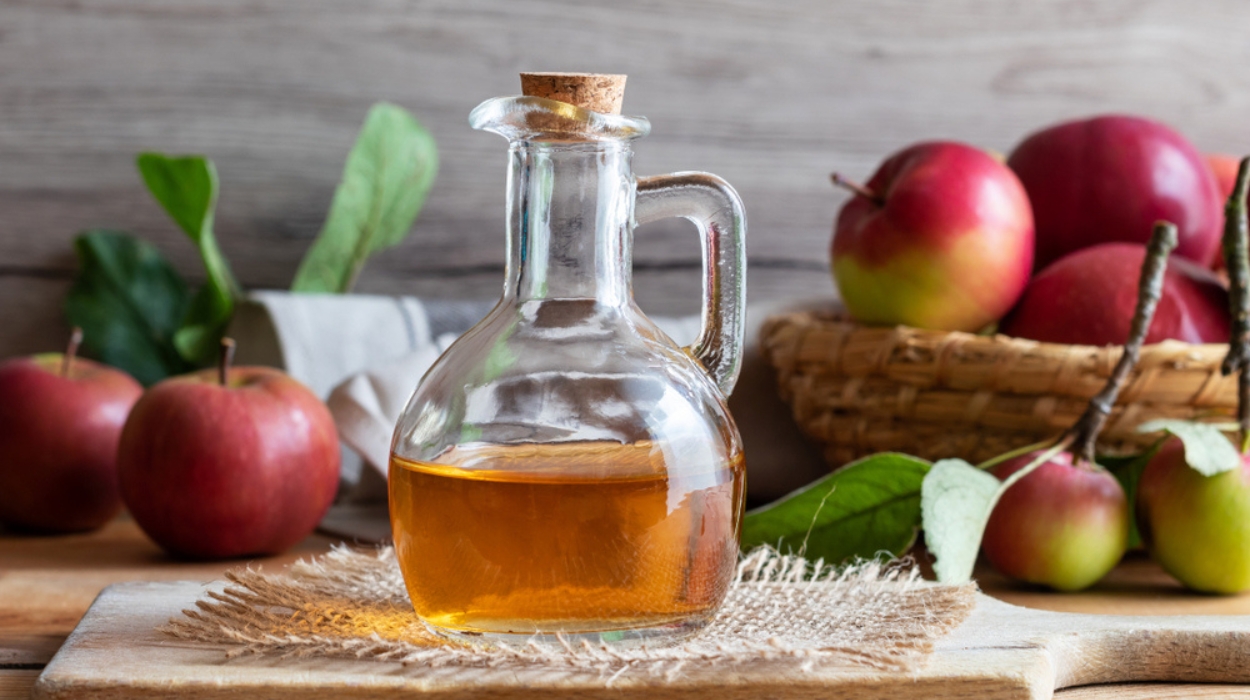There always seems to be some trending weight loss drink that gets the internet in a tizzy. Before, it was chugging cayenne lemon detox water for weight loss first thing in the morning. Now, it’s taking apple cider vinegar shots before a meal.
Apple cider vinegar, or ACV, is a tangy, fermented apple vinegar. It’s rich in acetic acid, which might have weight-loss benefits. But is there enough science to back it up?
Read on to find out how to use apple cider vinegar to lose belly fat — and if it’s really worth it.
How To Lose Belly Fat With Apple Cider Vinegar
There isn’t enough evidence to support apple cider vinegar for fat loss. However, a few smaller studies show positive results through appetite suppression and blood sugar control. To begin:
- Start with small amounts.
- Dilute properly.
- Combine with healthy habits.
How To Use Apple Cider Vinegar To Lose Belly Fat

Here’s how to use apple cider vinegar to reduce belly fat and achieve your weight loss goals:
Start With Small Amounts
There’s a reason why drinking apple cider vinegar isn’t even more popular — it’s vinegar! The taste can be quite strong for many people. To start, try one teaspoon diluted in a large 8-ounce glass of water.
If you’re not a fan of drinking it, you can also add a small amount to dishes like baked goods or sauces, where the flavor won’t be as strong.
Dilute Properly
ACV should not be drunk without diluting it in water. It can damage your tooth enamel[1] and cause digestive discomfort.
After starting with one teaspoon in 8 ounces of water, slowly increase to one or two tablespoons[2] of ACV. Like bone broth, it’s one of many drinks during intermittent fasting that can help to curb your appetite.
Just be sure to observe any side effects, like stomach upset or sensitive teeth.
Combine With Healthy Habits
Wondering how to lose belly fat with apple cider vinegar? Well, drinking ACV without changing any other habits isn’t likely to help you lose belly fat overnight.
To lose weight, you have to create a caloric deficit. That means focusing on exercise and eating habits. For example, try strength training or cardio to lose weight two days a week to start. You don’t need to do a certain number of miles per day to lose weight — slow and steady wins the race.
Just like starting slow when adding apple cider vinegar to your diet, slowly alter one habit at a time. For example, a light walk after dinner might prevent late-night snacking.[3] Dancing to upbeat music in the morning can increase serotonin.[4] That means you can start your day in a better mood and reduce stress, which is linked to weight gain.[5]
Other Ways To Add ACV To Your Diet

If you want to know how to use apple cider vinegar to burn belly fat, you’ll be happy to know that you don’t have to chug ACV water every morning. You can add ACV to a healthy diet in a variety of creative ways, including:
- Dips.
- Baking.
- Pickling.
- Smoothies.
- Marinades.
- Salad dressing.
- Vegetable juices.
- Soups and stews.
- Sauces and condiments.
Have fun experimenting with ACV by adding it to old favorites and new recipes to avoid diet boredom.
How Does Apple Cider Vinegar Help You Lose Fat?
Currently, there isn’t enough conclusive evidence[6] to fully support ACV’s use for fat loss. Some limited research, however, shows an association with fat reduction.
Helps Burn Fat
ACV is rich in acetic acid, which has been shown to reduce fat storage in the body. One small study followed 39 participants on a restricted calorie diet either in a control group or taking ACV. Those taking ACV showed more significant reductions in their body mass index,[7] hip circumference, and visceral fat.
Visceral fat is the type of fat that surrounds your organs. It’s associated with cardiometabolic risk factors,[8] especially in overweight or obese subjects in studies, and women in particular.
Suppresses Appetite
The acetic acid in ACV might also help to promote a feeling of fullness by reducing how quickly food leaves your stomach[6] — which can lead to reduced calorie intake. Participants who drank ACV also had a reduced appetite.[7]
However, other studies suggest that the reduced appetite might be due to vinegar-induced nausea.[9] If this is indeed the reason, recommending ACV as an appetite suppressant doesn’t seem appropriate.
Boosts Metabolism
ACV might enhance the activity of an enzyme that decreases fat and sugar production[10] in the liver. By doing so, ACV might help the body use stored fat for energy, supporting fat loss and metabolic health.
Improves Blood Sugar Control
ACV may help balance blood sugar[11] by inhibiting amylase[12] — the enzyme that breaks down carbohydrates. Stable blood sugar is important for weight management as it can help prevent cravings[13] and overeating.
Experts suggest consuming 10-30 milliliters of ACV daily[12] — around 2-6 tablespoons — to reduce blood sugar spikes after carby meals.
Provides Anti-Inflammatory Properties
Chronic inflammation is linked to obesity[14] and metabolic syndrome. ACV has anti-inflammatory properties[15] that may help reduce inflammation.
Inflammation is also linked with mental health disorders,[16] such as an increase in depression and anxiety symptoms. When struggling with mental health or stress, a domino effect of processes might occur that make weight loss more difficult. For example, not having the energy to cook healthy or work out, worsened sleep quality, and increased cravings for sugar[17] and fat.
Potential Side Effects
While apple cider vinegar has its benefits, there are potential side effects you should be aware of, such as:
- Tooth enamel erosion: ACV’s acidity can erode tooth enamel,[18] especially if consumed undiluted.
- Digestive discomfort: Some people may experience an upset stomach or nausea[19] after drinking ACV.
- Throat burns: You may feel a burning in your throat[20] if you drink ACV undiluted and in large amounts.
- Drug interactions: ACV can interfere with certain medications,[21] such as diuretics and insulin.
As with any health and wellness supplement, always talk to your doctor before adding ACV to your routine.
Conclusion
ACV works by potentially suppressing your appetite, burning fat, and improving blood sugar control. Adding it to your diet might help you lose weight — but other healthy habits must be combined for effective results. That includes creating a caloric deficit by eating well and moving your body in ways you enjoy for long-lasting healthy living.
Frequently Asked Questions
Some people drink ACV before meals since it might promote a feeling of fullness and reduce calorie intake.
There’s no definitive answer as to when it’s best to drink ACV for weight loss. It all depends on what time is easiest for you.
Drinking ACV daily may help improve digestion and blood sugar control. However, it must be consumed in moderation and diluted with water to prevent negative side effects.
There’s no significant difference in ACV’s effects, whether it’s hot or cold — that’s a matter of personal preference.
Pregnant and breastfeeding women,[22] or those with certain health conditions or on medication, should avoid consuming ACV more than food amounts. Always talk to your doctor before starting ACV.
Lying down immediately after consuming apple cider vinegar may lead to heartburn or reflux. You may also want to wait to brush your teeth since the acidity can weaken tooth enamel.
 Evidence Based
Evidence Based
